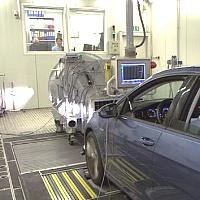(BRUSSELS) – The EU institutions reached a provisional agreement Thursday on reform of type-approval and market surveillance for motor vehicles, raising the quality and independence of car type-approval and testing.
According to the deal, Member States will have to carry out checks on at least one in every 40,000 newly registered vehicles, and 20 percent of those checks will have to include emissions tests.
This follows the Dieselgate scandal, which demonstrated a need for strong EU oversight over national type-approval authorities. This is to ensure that European consumers enjoy the same level of protection across the EU.
Audits will also help prevent national regulators giving their own car makers preferential treatment.
Dieselgate revealed the weaknesses in Europe’s regulatory and market surveillance system, said Industry Commissioner Elzbieta Bienkowska: “We know that some car manufacturers were cheating and many others were exploiting loopholes. To put an end to this, we are overhauling the whole system. After almost two years of negotiations, I welcome that the key elements of our proposal have been upheld, including real EU oversight and enforcement powers. In the future, the Commission will be able to carry out checks on cars, trigger EU-wide recalls, and impose fines of up to 30,000 per car when the law is broken,” she said.
The main building blocks of the new rules are:
- Raise the quality level and independence of type-approval and testing before a car is placed on the market:
- Technical services will be regularly and independently audited, on the basis of stringent performance criteria, to obtain and maintain their designation by a Member State for testing and inspecting new car models. The Commission and other Member States will be able to challenge a designation when something is wrong.
- National type-approval authorities will be subject to Commission audits to ensure that the relevant rules are implemented and enforced rigorously across the EU.
- The Commission’s proposal to modify the remuneration system to avoid that technical services are paid directly by the manufacturer was not maintained.
- Increase checks of cars that are already on the EU market:
- While the current type-approval rules deal mainly with ex ante controls of prototypes taken from the production line, in the future Member States will have to carry out regular spot-checks on vehicles already on their market and such results will be made publicly available.
- All Member States will now be able to immediately take safeguard measures against non-compliant vehicles on their territory without having to wait for the authority that issued the type-approval to take action, as is currently still the case.
- European oversight:
- In the future, the Commission will carry out market checks independently from Member States and will have the possibility to initiate EU-wide recalls. It will have the power to challenge the designation of technical services, and to impose administrative penalties on manufacturers or technical services of up to 30,000 per non-compliant car.
- The Commission will lead a new enforcement forum to ensure a more uniform interpretation of relevant EU legislation, complete transparency on cases of non-compliance, and better and more coordinated market surveillance activities by Member States.
The new Regulation maintains the current ban on defeat devices, which national authorities have a standing obligation to police and enforce, but goes a step further. In the future, car manufacturers will have to provide access to the car’s software protocols. This measure goes hand in hand with the Real Driving Emissions package, which will make it very difficult to circumvent emission requirements and includes an obligation for manufacturers to disclose their emissions reduction strategies, as is the case in the U.S.
The preliminary political agreement reached by the European Parliament, Council and Commission in so-called trilogue negotiations is now subject to formal approval by the European Parliament and Council. The Regulation will then be directly applicable in all Member States and will become mandatory on 1 September 2020.
FAQs: EU action to curb air pollution by cars (31 August 2017)



